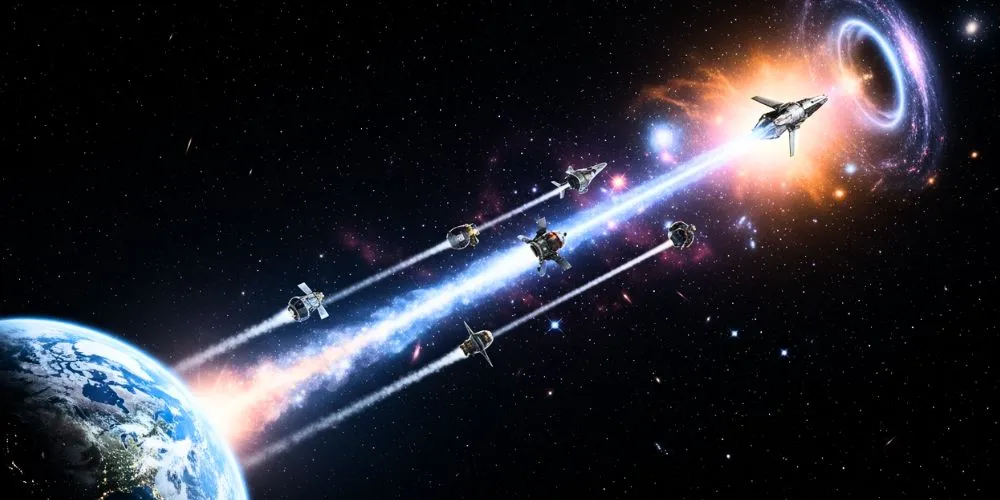Space exploration has been one of humanity’s most ambitious endeavors, with space pioneers playing a pivotal role in pushing the boundaries of the final frontier. This article explores the historical significance of space pioneers, their contributions to space exploration, and their lasting impact on our understanding of the cosmos.
Early Visionaries and Theoretical Pioneers
The roots of space exploration can be traced back to early visionaries and theoretical pioneers who laid the theoretical groundwork for humanity’s journey beyond Earth. Visionaries like Konstantin Tsiolkovsky, a Russian scientist and visionary, conceptualized the idea of space travel and rocketry, laying the foundation for future space exploration.
Konstantin Tsiolkovsky – Father of Astronautics
Konstantin Tsiolkovsky, born in 1857, is often hailed as the “Father of Astronautics.” His visionary work included the development of rocket equations and the concept of multi-stage rockets, anticipating the principles that would later enable human spaceflight. Tsiolkovsky’s ideas set the stage for the practical realization of space travel.
Robert H. Goddard – Pioneer of Rocketry
In the United States, Robert H. Goddard, an American physicist, is recognized as a pioneer in rocketry. His groundbreaking work in the early 20th century laid the foundation for liquid-fueled rockets, marking a crucial advancement in rocket technology. Goddard’s inventions played a crucial role in the development of space exploration capabilities.
The Space Race and Soviet Pioneers
In the mid-20th century, they witnessed Space Pioneers’ efforts intensifying during the Cold War, leading to the historic Space Race between the United States and the Soviet Union. Soviet space pioneers achieved several significant milestones, showcasing their technological prowess and reshaping the trajectory of space exploration.
Yuri Gagarin – The First Human in Space
On April 12, 1961, Yuri Gagarin, a Soviet cosmonaut, created history by becoming the first human to orbit the Earth. Gagarin’s pioneering flight aboard the Vostok 1 spacecraft marked a monumental achievement in space exploration, demonstrating the feasibility of human space travel and establishing the Soviet Union as a spacefaring nation.
Valentina Tereshkova – First Woman in Space
Valentina Tereshkova, another Soviet cosmonaut, made history in 1963 as the first woman to travel to space. Her mission aboard Vostok 6 helped break down gender barriers in space exploration and inspire future generations of women to pursue careers in STEM fields.
The Apollo Program and American Pioneers
In response to the Soviet Union’s early successes, the United States initiated the Apollo program to land humans on the Moon. American space pioneers, including astronauts like Neil Armstrong and Buzz Aldrin, played instrumental roles in achieving this historic feat.
Neil Armstrong – First Human on the Moon
On July 20, 1969, Neil Armstrong took humanity’s first steps on the lunar surface during the Apollo 11 mission. His iconic words, “That’s one small step for [a] man, one giant leap for mankind,” resonated globally and symbolized the triumph of human exploration. Armstrong’s courage and pioneering spirit left an indelible mark on the history of space exploration.
Sally Ride – America’s First Woman in Space
Sally Ride made history in 1983 as the first American woman to journey to space aboard the Space Shuttle Challenger. Ride’s achievements shattered gender stereotypes in the space industry and paved the way for increased diversity in future space missions.
International Collaboration and Modern Pioneers
As space exploration entered the 21st century, international collaboration became a hallmark of space missions. Modern pioneers from various countries have continued to contribute to our understanding of space, advance scientific research, and expand the boundaries of cosmic exploration.
Chris Hadfield – Social Media Pioneer in Space
Canadian astronaut Chris Hadfield gained international acclaim for his social media presence during his time aboard the International Space Station (ISS). Hadfield utilized platforms like Twitter and YouTube to share captivating images, videos, and insights, connecting people worldwide with the wonders of space.
Mae Jemison – Trailblazing Astronaut and Advocate
Mae Jemison, an American astronaut, became the first African American woman to travel to space in 1992. Beyond her historic spaceflight, Jemison has strongly advocated for STEM education and continues inspiring future generations to pursue careers in science and exploration.
International Space Station (ISS) Collaborators
The ISS is a testament to international collaboration in space exploration, with astronauts from various countries living and working together in orbit. Pioneers from Russia, the United States, Europe, Japan, and Canada have contributed to the ongoing scientific research and technological advancements aboard the ISS.
The Future of Space Pioneering
As humanity looks to the future, the legacy of space pioneers continues to inspire a new generation of explorers. The challenges and opportunities of cosmic exploration will require innovative approaches and the collective efforts of individuals who carry the spirit of pioneering into the vast unknown.
Private Space Companies and Entrepreneurial Pioneers
The emergence of private space companies, including SpaceX and Blue Origin, among others, marks a new era of entrepreneurial pioneers. Visionaries like Elon Musk and Jeff Bezos are driving innovations in space travel, with ambitions ranging from lunar exploration to the colonization of Mars.
Artemis Program and the Next Lunar Pioneers
NASA’s Artemis program aims to return humans to the Moon, with plans to include the first woman and the next man on lunar expeditions. The Artemis missions will mark a new chapter in lunar exploration, with a diverse cadre of astronauts poised to become the next generation of lunar pioneers.
Mars Colonization and Interplanetary Pioneers
The prospect of human colonization on Mars presents a bold frontier for future space pioneers. Ambitious missions from organizations like SpaceX envision the establishment of human colonies on the Red Planet, requiring pioneers with the resilience and adaptability to thrive in Mars’ harsh conditions.
Conclusion
Space pioneers, from the early visionaries to the modern-day explorers, have shaped the course of human history and expanded our understanding of the cosmos. Their courage, dedication, and innovative spirit have transformed space exploration from a distant dream into a tangible reality. As we stand on the shoulders of these pioneers, the journey into the final frontier continues, propelled by the same curiosity and pioneering ethos that have defined humanity’s quest for cosmic knowledge.





